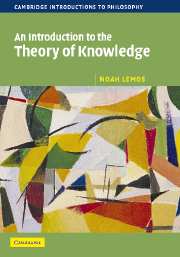Book contents
- Frontmatter
- Contents
- Preface
- 1 Knowledge, truth, and justification
- 2 The traditional analysis and the Gettier problem
- 3 Foundationalism
- 4 The coherence theory of justification
- 5 Reliabilism and virtue epistemology
- 6 Internalism, externalism, and epistemic circularity
- 7 Skepticism
- 8 The problem of the criterion
- 9 The a priori
- 10 Naturalized epistemology
- Select bibliography
- Index
9 - The a priori
- Frontmatter
- Contents
- Preface
- 1 Knowledge, truth, and justification
- 2 The traditional analysis and the Gettier problem
- 3 Foundationalism
- 4 The coherence theory of justification
- 5 Reliabilism and virtue epistemology
- 6 Internalism, externalism, and epistemic circularity
- 7 Skepticism
- 8 The problem of the criterion
- 9 The a priori
- 10 Naturalized epistemology
- Select bibliography
- Index
Summary
In this chapter we shall explore some views about a priori knowledge and justification. Many philosophers are convinced that we are justified in believing some things a priori, but, as we shall see, there are different views about how we might explain or define the concept of a priori justification. Moreover, philosophers disagree about the scope or extent of our a priori knowledge and justification. In the first section, we shall consider different views about what it is for a proposition to be justified a priori. In the second section, we shall consider some views about basic a priori justification. Must beliefs that enjoy basic a priori justification be certain, indefeasible, and true? Those who answer “yes” favor a “strong” account of a priori knowledge and justification. Others favor a more modest account. In the final section, we shall examine some views about what it is for a proposition to be analytic and we will consider briefly whether our a priori knowledge is confined to propositions that are analytic.
A priori justification
We know some propositions because we infer them from other things we know. A man might know, for example, that his wife is home because he infers it from the facts that her car is in the driveway, her coat is on the back of the chair, and he hears footsteps upstairs. Or, one might infer from various propositions of geometry that the Pythagorean Theorem is true. Reason or reasoning plays some role in our inferential knowledge.
Information
- Type
- Chapter
- Information
- An Introduction to the Theory of Knowledge , pp. 179 - 200Publisher: Cambridge University PressPrint publication year: 2007
Accessibility standard: Unknown
Why this information is here
This section outlines the accessibility features of this content - including support for screen readers, full keyboard navigation and high-contrast display options. This may not be relevant for you.Accessibility Information
- 1
- Cited by
